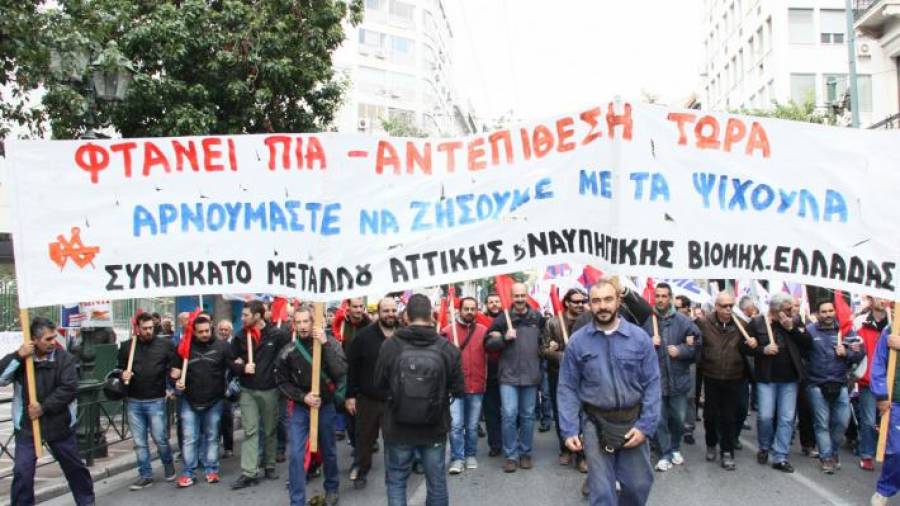Since October 1st, started the implementation of the new Collective Contract for Shipbuilding and Ship Repair Works workers signed by the Attica Metalworkers and Shipbuilding Industry Union -Member of PAME- with the Association of Shipbuilding Companies (SENAVI), which gives raises in salaries, confirms and extends a series of rights as demanded by workers through their struggle.
The signing of the new Contract came through the hard battle that the Union has been fighting for years now. According to the union, the new Collective Contract came as a continuation of the previous fights for Collective Contract, three years ago, signed in 2017. That on was the first Collective Contract signed after 10 years, and came after 9 months of mobilizations, securing a series of basic demands and set the day wages. However, the battle continued for its implementation as there were employers who did not implement it because they were not members of SENAVI but also employers who did not implement it even though they were members.
“Implementing the Contract was a daily battle. With dozens of mobilizations in the workplaces, we managed to impose it to the vast majority of the industry. This is due to the reflexes of the workers who immediately informed the Union when it was not implemented or in places where the employers were not members of SENAVI. The Union on the spot proceeded with mobilizations demanding and succeeding in the implementation by the employers, members and non-members of SENAVI “.
In this valuable experience was based, the battle for the new Collective Contractin 2021. The new workers, for the first time, responded and participated universally in the call of the Union for a militant demand claim of the new Collective Contract. Then and now, hundreds of new members joined the Union”.
For the current contract, we started mobilizations since the beginning of 2021. We mainly went on work stoppages, during which we informed our colleagues, while in the summer we carried out three strikes within a month. Our fight ended in a preliminary agreement with SENAVI in the middle of the summer that a few days ago became Collective Contract. It was not an easy fight.
The employers started with the demand to start the negotiations from scratch, as if there was no previous Collective Contract, taking courage from the anti-workersattack of the government. They wanted issues such as working hours, overtime pay and more to discuss from the beginning. However, with our mobilizations and the universal participation of our colleagues, who knew exactly why they were fighting, we canceled their goals “.
What the new BCC brings? First of all, it maintains what the previous one provides. It secures the 7-hour – 5-day – 35-hour work time. It rejects any overtime replacement within a model of working time arrangement and provides overtime compensation from the first hour, with a 100% surcharge, provides 4 – 5% daily wage increases depending on the profession and a series of other conquests.
However, the battle does not end here, as before, so now we are fighting for the implementation of these commitments. We have to deal with employers who will try not to implement it or who have not yet committed to implement it. We still have the government against us. In the previous Collective Contract of 2017 we had submitted an application to the then government of SYRIZA to make it mandatory for all shipbuilding and repair companies, but it rejected it because based on the anti-labor framework it must be proven that the companies that sign it employ 50% plus 1 of employees of the industry, which was impossible since the employers’ union refused to provide a list of its member companies.
With the signing of the Collective Contract of 2021, we submitted the same request to the current government of ND. They answered us the same as the previous one, this time referring to the new law of Minister Hatzidakis, that is, to document that the Collective Contract does not affect the competitiveness of the companies!
It is therefore obvious that the battle for the Collective Contract does not end with its signing, that it continues for its implementation and this requires a relentless struggle, in conflict with the imposed anti-workers laws, with constant care for the greatest possible participation of workers through the lines of the Union “.


